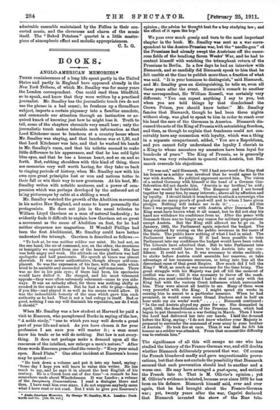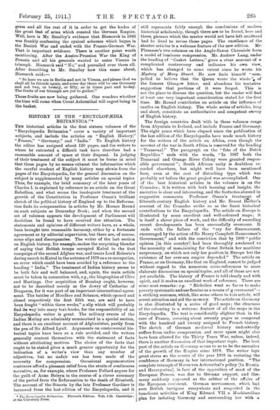BOOKS.
ANGLO-AMERICAN MEMORIES.* 'THESE reminiscences of a long life spent partly in the 'United States and partly in England have appeared already in the New York Tribune, of which Mr. Smalley was for many years the London correspondent. One could read them blindfold, so to speak, and know that they were written by a practised journalist. Mr. Smalley has the journalistic touch (we do not use the phrase in a bad sense); he freshens up a threadbare subject, imports a certain piquancy into a familiar anecdote, and commands our attention through an instinctive or ac- quired knack of knowing just how he might lose it. Truth to tell, some of the chapters chronicle very small beer ; only the journalistic touch makes tolerable such information as that Lord Kitchener came to luncheon at a country house where Mr. Smalley was staying, and that luncheon was at 1,30, and that Lord Kitchener was late, and that he washed his hands in Mr. Smalley's room, and that his toilette seemed to make little difference to his appearance, and that he has cold light bine eyes, and that he has a human heart, and so on and so forth. But, rubbing shoulders with this kind of thing, there are memories very well worth having, for they take us back to ringing periods of history, when Mr. Smalley saw with his own eyes great principles lost or won and nations totter to their fall or win their way to new greatness. At his best, Mr. Smalley writes with notable neatness, and a power of com- pression which was perhaps developed by the enforced art of being picturesque by cable at a shilling a, word.
Mr. Smalley watched the growth of the Abolition movement in his native New England, and came to know personally the protagonists. He does not join in the usual tributes to William Lloyd Garrison as a man of natural leadership ; he evidently finds it difficult to explain how Garrison set so great a, movement as the cause of Abolition on foot, for he had neither eloquence nor magnetism. If Wendell Phillips had been the first Abolitionist, Mr. Smalley could have better
understood the triumph. Garrison is described as follows:— "To look at, he was neither soldier nor saint. Ho had not, on the one hand, the air of command, nor, on the other, the sweetness or benignity we expect from one of the heavenly host. Hie face was both angry and weak. His attitude on the platform was half apologetic and half passionate. His speech at times was almost shrewish. It was never authoritative, though always self-com- placent. So was the expression of his face, with its smile which tried to be amiable and succeeded in being self-conscious. There was no fire in his pale eyes ; if there had been, his spectacles would have dulled it. He stooped, and his most vehement appeals—they were often extremely vehement—came to you side- ways. It was an unlucky effect, for there was nothing shifty or crooked in the man's nature. But he had a role to play—Isaiah, if you like—and played it as well as his means would allow. It was the indomitable honesty of the man which gave him such authority as he had. That is not a bad eulogy in itself. Bad or good, nothing I can say will diminish his reputation, nor do I wish it should."
When Mr. Smalley was a law student at Harvard he paid a visit to Emerson, who paraphrased Burke in saying of the law,
"A noble study," "one to which you may well devote a great part of your life and mind. As you have chosen it for your profession I am sure you will master it ; a man must know his trade or he will do nothing. But law is not every- thing. It does not perhaps make a demand upon all the resources of the intellect, nor enlarge a man's nature." After these words Emerson prescribed the remedy : "Keep your mind open. Read Plato." One other incident at Emerson's house may be quoted :—
" He took down a volume and put it into nay hand, saying : ' Some day I hope you will learn to value this writer. He has much to say, and he says it in almost the best English of his century. He is a Greek born out of due time '—a remark he has somewhere made about Winckelmann. It was Lander; a volume of the Imaginary Conversations. I read a dialogue there and then. I have read him ever since. I do not suppose anybody cares what I have read or not mad. But I wish to give you Emerson's • .auglo-Amerians Memories. By George W. Smalley, M.A. Loudon: Duck- worth and Co. [12e. 6d. net.] opinion ; the advice he thought best for a boy studying law; and the effect of it upon the boy."
We pass over much gossip and turn to the most important chapter in the book. Mr. Smalley was sent as a war corre- spondent to the Austro-Prussian war, but the "needle-gun " of the Prussians had already swept the Austrians off the nume- rous fields of the headlong Seven Weeks' War, and he had to content himself with watching the triumphant return of the Prussians to Berlin. In a few days he had an interview with Bismarck, and so candidly did Bismarck speak to him that he felt unable at the time to publish more than a fraction of what was said. " It is your business to distinguish," said Bismarck, and Mr Smalley goes on distinguishing, he tells us, even all these years after the event. Bismarck's remark to another war correspondent, Sir William Russell, was certainly very different: "You can repeat anything I say to you, but when you are told things by that dunderhead the Crown Prince, you should know better." Mr. Smalley fancies that Bismarck, though he had been three nights without sleep, was glad to speak to him in order to reach over his head the ears of the Germans in America. Bismarck dis- cussed the acts of the King of Prussia with astonishing freedom, and then, as though to explain that frankness could not con- ceivably have any connection with loyalty, which was a thing in a separate compartment, added, " You are a Republican, and you cannot fully understand the loyalty I cherish to a King to whose ancestors my ancestors have been loyal for hundreds of years." The King of Prussia, as is generally known, was very reluctant to quarrel with Austria, but Bis- marck overrode his objections.
"It was not," said Bismarck, "till I had convinced the King that his honour as a soldier was involved that he would agree to the war with Austria. No political argument moved him. The vision of a united Germany with himself at the head of a German Con- federation did not dazzle him. 'Austria is my brother,' he said ; 'the war would be fratricidal. The Emperor and I are bound together by many ties, by many interests ; above all by affection and by loyalty. I should think it treacherous to attack a sovereign who has given me many proofs of good-will and to whom I have given pledges. Nothing will induce me to do it.' All this time I was preparing for war with Austria after Denmark. The King must have known what it all meant, but he did not stay his hand nor withdraw his confidence from us. After the peace with Denmark there was no longer any reason for military preparations except Austria. But the King still allowed me to go on. In January, 1865, the Parliament again rejected the budget. The King rejoined by seizing on the public revenues in the name of the State. The public knew nothing of what I had in mind. The Parliament knew nothing. If it had been possible to take Parliament into my confidence the budget would have been voted. The Liberals have admitted that. But to take Parliament into my confidence would have been to take Austria into any con- fidence. It could not be. It was necessary to strike suddenly; to strike before Austria could assemble her reserves, or take advantage of her immense resources, or bring into line all the discordant races of that great Empire. How much did I tell the King ? Well, as much as was necessary for the time being. The great struggle with his Majesty was put off till the moment of conflict was near ; till it was necessary to throw off the mask. Besides, you must consider that I had to deal not only with the King but with the various Court influences which surrounded him. They were almost all hostile to me. Many of them were very powerful with the King. I might spend six weeks in coaxing him to assent to a particular measure. When he had promised, in would come some Grand Duchess and in half an
hour undo my six weeks' work." Bismarck continued : " In the end Austria played my game for me. She demanded in April, 1866, the demobilization of the Prussian forces, which had begun to put themselves on a war footing in March. Then I knew the Lord had delivered her into our hands. I laid the demand before the King, saying : 'I do not know whether your Majesty is prepared to surrender the command of your army to your brother of Austria.' He took fire at once. Then it was that he felt his honour as a soldier was attacked. From that moment the difficulty was to restrain him."
The significance of all this will escape no one who has studied the history of the Franco-German war, and still doubts whether Bismarck deliberately procured that war. Of course the French blundered madly and gave unquestionable provo- cations, but that does not exclude the possibility that Bismarck secured that each provocation should lead to another and a worse one. He may have arranged a gust-apens, and enticed the French into it. That is M. 011ivier's opinion ; yet M. 011ivier's evidence is tainted, because ever since 1870 he has been on his defence. Bismarck himself said, over and over again, that he had brought about the Franco-German war; yet, twenty years after the war, Caprivi declared that Bismarck invented the storm of the Ems tele,
gram and all the rest of it in order to get the kudos of the great feat of arms which created the German Empire.
Well, here is Mr. Smedley's evidence that Bismarck in 1866 was frankly confessing the cynical schemes which began in the Danish War and ended with the Franco-German War. That is important evidence. There is another point worth mentioning. After the Anstro-Prussian War the King of Prussia and all his generals wanted to enter Vienna in triumph. Bismarck said " No," and prevailed over them all. After describing to Mr. Smalley how this came about, Bismarck said:- " So here we are in Berlin and not in Vienna, and please God we shall all be friends again, and some day there will be one Germany and not two, or twenty, or fifty, as in times past and to-day. The fruits of our triumph are yet to gather."
Those fruits are now being gathered. One wonders whether the time will come when Count Aehrenthal will regret being in the basket.







































 Previous page
Previous page